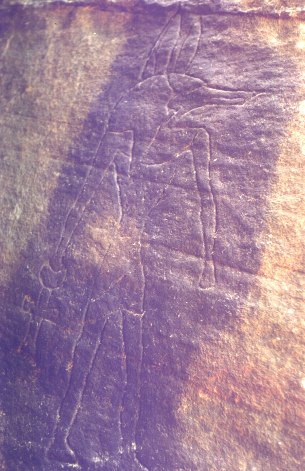Wednesday, September 30, 2015
PS4 System Software Update 3.00 Out 9/30, Take a Visual Tour
The 3.00 system
software update on PS4, codename: Kenshin, will be available to download
starting tomorrow, September 30th. We want to extend our sincere thanks to
everyone that participated in the beta. I want you to all know that we’ve
listened. Your feedback made this system software update even better.

There are a lot of
changes in this update, from entirely new features to UI enhancements. While we
detailed its key features earlier this month, we wanted to give a visual tour
of our favorite new additions. This update is focused on creating new ways to
connect with friends and players around the world, expanding the social
capabilities of the system even further.
Sharing video clips to
Twitter: Now it’s easy to share video clips to Twitter directly from your PS4.
You’ll see a new icon on the Upload Video Clip menu, nestled between Facebook and
YouTube. Maximum video length is 10 seconds, though you’ll have the ability to
trim longer clips. Don’t forget — you can double tap the Share button to start
recording a video, and press it again to stop.


PlayStation Plus: We’ve
made a dedicated section for PlayStation Plus, which you can access by clicking
the big Plus icon on the top left corner of your PS4 home screen. Once there
you can easily manage your membership, see the monthly free games to download,
deals for PS Plus members, and all of the games you’ve redeemed through PS Plus
on PS4.
YouTube live: You’ll
see a new icon for YouTube on the Broadcast Gameplay Screen, accessible after
hitting the Share button. Now you can live stream directly from your PS4 to
YouTube. Livestreams will be viewable across YouTube.
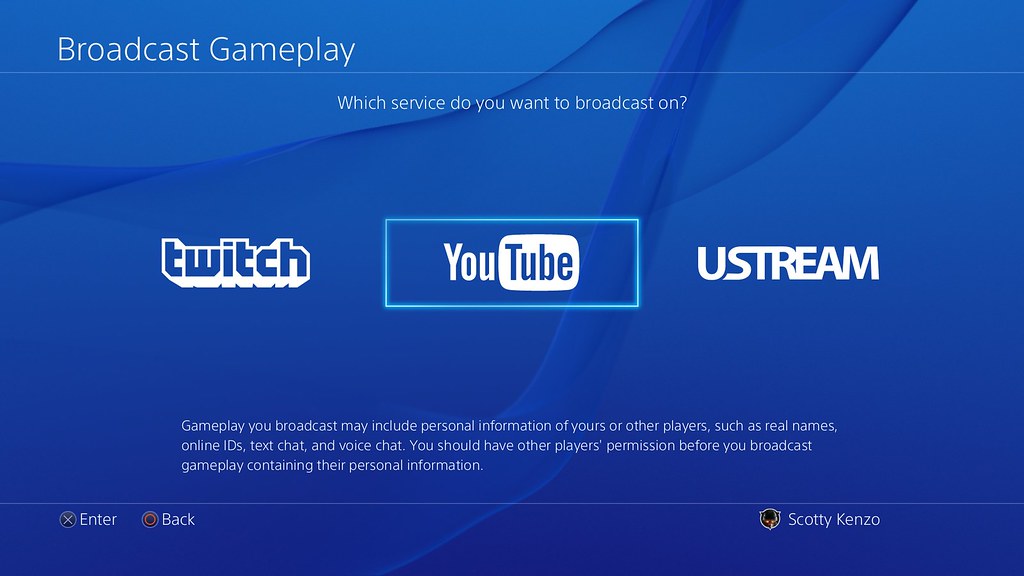
PNG Screenshots: If
you’d like your game screenshots to be in a higher quality format, you can now
select PNG instead of JPEG. To access, press Share > Share Settings >
Screenshot Settings > Image Format.
Events: A new hub for
Events has been added to PS4, accessible from the home screen. This will give
you an overview of activities taking place in the games you play most, as well
as official broadcasts. For instance, here’s an in-game racing event taking
place in Project Cars, which you can register for directly from the Events hub.
Improvements to
Messages and Favorite Groups: We’ve improved Messages by making it easier to
access groups of people you chat and play games with frequently. Once you’re
added to or create a group, you’ll see the online status for friends, what
games they are playing, and the option to message or chat in party all in one
spot. When you add or create a new favorite group, they’ll appear in your
Friends app under Favorite Groups for quick access. For example, you can see we
have favorite groups for Call of Duty, Rocket League, and Destiny.
Source: Playstation Blog
The Competition Between Twitch and YouTube Gaming Is Heating Up
There's nothing like a
little competition to get a market going, and that's exactly what's happening
with Amazon.com's (NASDAQ:AMZN) recently acquired Twitch and Google's
(NASDAQ:GOOG)(NASDAQ:GOOGL) recently launched YouTube Gaming. For a while,
Twitch was the only video game live streaming name in town. That all changed
this summer, when YouTube officially entered the live-streaming game, after
reportedly opting not to acquire Twitch when it had the chance last year.
Lacking competition,
companies often don't have much incentive to innovate aggressively. With
YouTube Gaming's entry into a barren marketplace, the video-game live-streaming
market is bound to innovating at a faster pace, benefiting consumers.
Twitch continues to
grow like crazy
Twitch hosted its
first-ever TwitchCon convention last week, and announced a handful of new
features. While Twitch live streaming is already directly integrated into
next-generation consoles, the PlayStation 4 will soon get a dedicated and
full-featured Twitch app. That will allow users to not only stream from the
PS4, but to also watch live streams.
There are now 1.7 million
Twitch broadcasters, up from the 1.5 million unique broadcasters per month that
Twitch enjoyed in 2014. So far in 2015, Twitch has had a peak concurrent
audience of 2.1 million viewers, more than double the peak 1 million concurrent
viewers from last year. The average user watches 1.5 hours of content per day.
Twitch's growth has been nothing short of breathtaking, which is why it was no
surprise that larger tech giants wanted to acquire the company last year, with
Amazon ultimately taking home the start-up.
The company is also
finally ditching Flash and will transition its site to the more modern HTML5
standard. Twitch is also improving its private messaging capabilities. But
perhaps the most notable new feature is the ability to upload saved videos directly,
a feature that will roll out next year.
Twitch and YouTube
Gaming want to become each other
To date, Twitch has
only supported live streams and archived live streams. It should go without
saying that uploading videos is a hallmark of YouTube, which should underscore
how serious Twitch is taking its newfound rival. YouTube and Twitch have
represented different sides of the video content coin: YouTube is king of
uploads while Twitch is the first mover in live streaming.
But as the two services
begin to compete more directly for eyeballs and ad dollars, they are bridging
the gaps. This is an important transition, since individual content creators
are often more willing to dedicate time into higher production values for
uploaded videos, lest all that effort go into waste during a live broadcast
that only fetches a small number of viewers. In other words, by adopting
uploaded videos, Twitch opens the door for higher quality content, which in
turn boosts engagement.
Building network
effects from scratch
On the back-end side of
things, YouTube is easily the most capable competitor to Twitch. With the depth
of Google's infrastructure capabilities, YouTube Gaming should have no problem
scaling its live streaming on the technical front. But YouTube Gaming's biggest
challenge will not be technical. The search giant has a long ways to go when it
comes to actually attracting both content creators and viewers away from the
dominant force in video-game live streaming.
A big part of that is
console integration, which makes it remarkably simple for average users to live
stream. YouTube Gaming will need to score this same level of integration
eventually if it hopes to meaningfully compete, but that shouldn't be hard for
Google.
As the live-streaming
market heats up, consumers will be the ultimate winners.
This business model is
pure genius
The world's biggest
tech company forgot to show you something, but a few Wall Street analysts and
the Fool didn't miss a beat: There's a small company that's powering their
brand-new gadgets and the coming revolution in technology. And we think its
stock price has nearly unlimited room to run for early-in-the-know investors!
Supercell talks community, ClashCon and eSports
With the first ever
official Clash of Clans community event, ClashCon, coming to Helsinki on 24
October, Supercell is acknowledging the importance of its fans.

Such an event also
raises a number of questions about traditional conceptions of casual and core
gameplay, the importance of community building, and even the potential for
Clash of Clans to enter eSports territory.
As such, we reached out
to Marika Appel, Clash of Clans Community Manager at Supercell, to talk more
about the wider significance of the upcoming event.
PocketGamer.biz:
Do you events like
ClashCon demonstrate that mobile games go beyond the oft-used 'casual'
description?
Marika Appel:
Absolutely. Our fanbase is certainly genuine, and very, very dedicated. The
reception of Clash of Clans has continued to surprise us since its launch three
years ago and we think it absolutely shows that the lines between ‘casual’ and
‘core’ are not as clear as people once thought they were.
Many of our players do
play Clash casually, but we’re also lucky enough to have a strong, dedicated
community of players who spend a lot of time in the game, have built
relationships with their clan members, set up events and meet-ups locally, and
are always looking for new ways to strategize and play.
ClashCon is all about
the community, so we just want to create a fun and beneficial experience for
our most dedicated players and celebrate them.
Do you think events
like this one showcase the rise of Clash of Clans as an eSport?
Anything is possible,
but no matter what we’ll always try to follow our community’s lead with Clash
of Clans.
Over the last year or
so we have seen an increase in people playing competitively, and on the other
side the spectatorship element of the game, which is why we’re hosting
tournaments at ClashCon.
We always want to
support our fans, and how they’re playing the game. To that end, we think our
community will be excited to see what’s coming for the game.
With regards to our
long-term vision, all I can say is that I don’t know, but, it’s certainly
within the realm of possibility if that’s where fans want to take it!
This year's ClashCon
will be held in Helsinki, but are there plans to bring ClashCon to other
countries and make it a more regular event?
For now we’re focused
on making our first-ever ClashCon here in Helsinki as fun and as valuable for
our community as possible.
But if there does end
up being enough of a demand for ClashCons in other regions we would certainly
look into delivering that.
How does community
impact the ongoing development of the game?
We do think it’s an
amazing experience for our developers to be able to see first-hand how much of
an impact the game they created has made.
ClashCon is a
celebration of our fans and an wonderful experience for our Clash of Clans team
to meet some of the most dedicated players from all over the world and learn
from them.
The community has had
an impact on game features, characters, updates, etc.
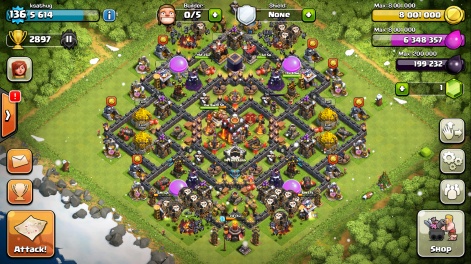
By Matt Suckley, Staff
Writer
Geek of the Week: eSports lawyer Bryce Blum is getting in on the ground floor of a booming industry
Geek of the Week
profiles the characters of Pacific Northwest tech, science, games, innovation,
and more. Be a Geek of the Week! Fill out our questionnaire to be considered.
eSports lawyer Bryce
Blum
Bryce Blum recently
left his comfortable job at a Seattle law firm to launch his own legal practice
and a new startup — both focused on the exploding eSports industry.
 eSports lawyer Bryce Blum
eSports lawyer Bryce Blum
Competitive video
gaming is just starting to take off, especially around the Seattle region,
where industry giants like Valve and Microsoft continue to attract a lot of
attention from gaming enthusiasts. Don’t understand all the hype? Just check
out the scene from the last time gamers competed for $18 million in prizes at
the Dota 2 championships inside Seattle’s Key Arena in April.
It’s a big-money
industry with lots of potential, and Blum wants to get in on the ground floor.
He maintains a legal
practice that represents eSports teams, event organizers and others in need of
legal services around the industry. He’s also the Director of eSports and
in-house counsel for Unikrn, a startup that burst onto the tech scene earlier
this year and has already drawn national attention and caught the eye of
investors like Mark Cuban and Ashton Kutcher.
“I’m a lawyer, sports
fan and an avid gamer,” Blum said. “Somehow, I managed to combine these
passions into a single career.”
Meet our new Geek of
the Week, and continue reading for his answers to our questionnaire.
unikrnWhat do you do,
and why do you do it? “I have a full-time practice in eSports law, representing
teams, leagues, tournament organizers, influencers, and other service providers
in the eSports industry. I’m also the Director of eSports and In-House Counsel
at Unikrn, an eSports startup based out of Seattle. Our mission is to heighten
viewership and engagement around eSports.
The why is pretty
simple: I love my industry and want to support its growth in any way I can.
It’s also just a lot of fun.”
What’s the single most
important thing people should know about your field? “That it exists. I like to
say eSports are the largest phenomenon no one has heard of. If you’ve never
heard of eSports, take the Google deep dive. Trust me, your mind will be
blown.”
Where do you find your
inspiration? “I’m a sucker for the texts from early American history, and for a
good movie speech. I get that it’s corny and cliché, but this type of stuff
actually resonates with me.”
What’s the one piece of
technology you couldn’t live without, and why? “My iPhone. I travel a lot and
I’m pretty much wired in 24/7 — much to my girlfriend’s chagrin. It’s
everything I could possibly need to stay connected, and it fits in my pocket.”
Work out in the morning. Getting exercise out
of the way will give you more energy and it frees up evenings for fun — or more
work.
What’s your workspace
like, and why does it work for you? “I have two work spaces: my condo and an
office at the WeWork in South Lake Union where Unikrn is based. Home is better
if I need total silence to just hammer out deliverables, but the energy from
the Unikrn team is contagious and too fun to miss out on for more than a couple
days in a row.”

Your best tip or trick
for managing everyday work and life. (Help us out, we need it.) “Work out in
the morning. Getting exercise out of the way will give you more energy and it
frees up evenings for fun — or more work. Plus it makes you feel like you’ve
started off the day on a productive foot.”
Mac, Windows or Linux?
“Windows.”
Kirk, Picard, or
Janeway? “Kirk.”
eSports lawyer Bryce
Blum
Transporter, Time
Machine or Cloak of Invisibility? “Time Machine. But I want the version that
comes with a remote control for life. I want to be able to rewind, fast forward
or go slow motion at will. Start by quickly rewinding to invest in Google, Microsoft,
Snapchat, Uber and Twitter. Then fast forward back to the present, bring an NBA
team back to Seattle and pretty much do what I’m doing now — but without having
to worry about money ever again. With that out of the way, I’d revel in being
able to skip the worst parts of life — traveling, mostly — while being able to
relive the best moments at the click of a button.”
If someone gave me $1
million to launch a startup, I would: “Do something in eSports. I can’t tell
you what. This dream might actually come true and if it does I’ll kick myself
for spilling the beans.”
I once waited in line
for: “When I was 10 years old, I waited in line for a few hours starting around
11 p.m. to see the national premiere of Rush Hour. So worth it.”
Your role models: “My mom,
who never stops trying to improve the world around her. My dad, who commands
the respect of everyone he meets by being the most thoughtful and genuine
person I know. And my grandmother, whose entire life is a constant reminder
that family is everything.”
Greatest Game in
History: “Super Smash Brothers for Nintendo 64, or basketball.”
Best Gadget Ever:
“Vitamix.”
First Computer: “I
honestly don’t remember. I know, I’m an awful Geek.”
Don’t stop pushing until you find a career you
love. It won’t be easy, and it might take a long time.
Current Phone: “iPhone
5.”
Favorite App: “Twitch.”
Favorite Cause: “The
Center for Children & Youth Justice. I have a lot of causes I’m passionate
about, but I love this organization. It focuses on juvenile justice and foster
care systems reform.”
Most important
technology of 2015: “Is the Google driverless car done yet? If so, I pick
that.”
Most important
technology of 2017: “Jet packs. I feel like we’ve been promised jet packs since
my childhood. Still holding my breath.”
Final words of advice
for your fellow geeks: “Don’t stop pushing until you find a career you love. It
won’t be easy, and it might take a long time. But life is too short and you
spend too much of it working to do anything that doesn’t make you excited to
get out of bed in the morning.”
BY JACOB DEMMITT on
September 29, 2015 at 3:00 pm
The Crescent-Moon As The Symbol of Islam
The crescent moon is
one of the oldest symbols known to humanity. In fact, it is the symbol of many
ancient civilizations. In ancient Egypt, the crescent moon was a symbol of
Mother goddess Hathor and Saitic Isis.
How did the
crescent-moon symbol of Saitic Isis in ancient Egypt become the symbol of Islam
today? I have a strong conviction that it was Al Ma'mun, the 7th Caliph of the
Abbasid Caliphate, who reduced this ancient symbol to de facto symbol of Islam.
Al Ma'mun Ibn Harun
(the 7th Caliph of Islam) was the founder of Abbasid library in Baghdad (I.e.
House of Wisdom), where ancient Egyptian, Greek and Byzantine-Christian texts
on philosophy and astronomy were translated into Arabic - many of these translated
texts would later go into the formulation of the Quran (see the Mihna). An Avid
astronomer, Al Ma'mun built astronomical observatories in Baghdad, and in
recognition of his contributions to astronomy, the crater Almanon on the moon
was named after him.
That Al Ma'mun was
seriously commitment to astronomy is old and well-known in history. What is
hidden, however, is how the knowledge of astronomy influenced Al Ma'mun, and
the role astronomy played in the codification of the Quran. Let me attempt to
bring what is hidden to light with scholarly facts; so, follow me.
To an average Muslim,
the word "Quran" means "to recite" or "to read "
in Arabic. The only problem with that meaning is that Arabic is not really a
language but a script. What many people call Arabic is actually a dialect of
middle Aramaic/Syriac. Prior to 7th-8th century CE, "Syriac was the medium
of communication and cultural dissemination for Arabs and, to a lesser extent,
Persians. Primarily a Christian medium of expression, Syriac had a fundamental
cultural and literary influence on the development of Arabic." (Dave
Johnson). In other words, most words in
Arabic can best be understood in Aramaic/Syriac. So let's examine the word
"Quran" in its original Syriac form. In Syriac, the word "Quran"
is written "Qryn" (consonantal Alphabet), meaning "Pentateuchal
reader."
What is the
"Pentateuch?" Contrary to what we've been generally told that the
Pentateuch is the Greek word for theTorah (the first 5 books of Moses); wrong,
the Pentateuch is a collection of 5 books on horoscopic astrology, written by
Dorotheus in 1st century CE Egypt. The Pentateuch, also known as Carmen
Astrologicum, was believed to have been
written originally in Greek, but was
later translated to Palhavi (Persian), Arabic and English respectively -
Similar translation was also found in the Indian Sanskrit, called
"Yavanajakata." In 7th-9th CE Arabia, the science of astrology that
started out in Ancient Egypt for tracking time had become an astrological chart
system for reading minds. Arabic authorities started using the interaction
between the moon and the sun (crescent moon) to read their client's minds - the
general saying then was "the sun receives the moon by exaltation and the
moon receives the sun by domicile." I believe Al Ma'mun was one of these
Arabic Authorities. Al Ma'mun built 2 astronomical observatories in Baghdad,
but he might have gotten his inspiration from Kabba in Mecca. Kabba, in
antiquity, was an astronomical observatory post, ignorantly referred to by Muslims
as a pagan shrine.
I'm convinced beyond
reasonable doubt that Arabic authorities reduced the ancient symbol of the
crescent moon to de facto symbol of Islam because of their commitment to
astronomy. In fact, the Abrahamic Triad scriptures can be seen as a compedium
of astrological charts and messages, disguised in ancient fables!
References
The Hidden Origins of
Islam, "Karl-Heinz Ohling," 2009
Walter Williams,
"The Historical Origin of Islam," 2003
Lionel Pepper,
"The Pentagram Through History," 2008
David Pingree
"Carmen Astrologicum book 1," translated 1976.
Religion - Etymology Origin
religion (n.)
c. 1200, "state of
life bound by monastic vows," also "conduct indicating a belief in a
divine power," from Anglo-French religiun (11c.), Old French religion
"piety, devotion; religious community," and directly from Latin
religionem (nominative religio) "respect for what is sacred, reverence for
the gods; conscientiousness, sense of right, moral obligation; fear of the
gods; divine service, religious observance; a religion, a faith, a mode of
worship, cult; sanctity, holiness," in Late Latin "monastic
life" (5c.).
According to Cicero
derived from relegere "go through again" (in reading or in thought),
from re- "again" (see re-) + legere "read" (see lecture
(n.)). However, popular etymology among the later ancients (Servius,
Lactantius, Augustine) and the interpretation of many modern writers connects
it with religare "to bind fast" (see rely), via notion of "place
an obligation on," or "bond between humans and gods." In that
case, the re- would be intensive. Another possible origin is religiens
"careful," opposite of negligens. In English, meaning "particular
system of faith" is recorded from c. 1300; sense of "recognition of
and allegiance in manner of life (perceived as justly due) to a higher, unseen
power or powers" is from 1530s.
To hold, therefore,
that there is no difference in matters of religion between forms that are unlike
each other, and even contrary to each other, most clearly leads in the end to
the rejection of all religion in both theory and practice. And this is the same
thing as atheism, however it may differ from it in name. [Pope Leo XIII,
Immortale Dei, 1885]
True Origin of Medusa – The lady with the snake hair? Or Dreadlocks?
Hakim was invited to be
an ambassador of peace, and lectured and shared his wisdom at many venues in
many different countries all over the world before he passed from this life, or
wested, as he would have said, in August of 2008.
Medusa, a real woman,
was the Afrikan serpent-goddess said to have worn a pouch around her waist
containing live snakes that represented wisdom and renewal. She was said to
have carried the original Gorgon mask to frighten off the unskilled, and it was
painted red to symbolize the power of menstrual blood with “gruesome glaring
eyes, bared fanged teeth and, like the Hindu Goddess Kali, a protruding tongue”
Goddess Inspired. Her name derived from
Egyptian Maat (Truth) “which also gives us the words medicine, mathematics, and
Sanskrit medha (female wisdom)”. “The Gorgons were a trinity whose names were
Medusa, Stheino, and Eurayle- or Wisdom, Strength, and Universality”. Blacked
Out through White Wash
Afrikan cultures were
unfamiliar to the people known as Europeans, and many of the Greek mythological
creatures originate from Afrikan civilizations. The snake hair assessment,
assuming these people(Greeks) did not know the name of the hairstyle, referred
to it as snake hair later creating classic myths depicting a goddess that
actually represented truth and was not a villain, into a monster, taught in
schools as Greek mythology.
Snake hair and
Dreadlocks?
The original, real life
Medusa, supposedly had dreads and the origin of dreads through ancient
discoveries existed before the fictional Medusa character was recreated. She
was the snake Goddess which is how Europeans formed their version of a monster
with hair of snakes, with a face that would turn any man to stone because of
fear, which developed from the Gorgon mask she carried with her.




Abd’el Hakim Awyan
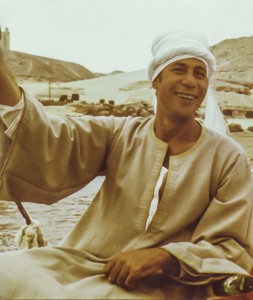
Born and raised in the
small village of Nazlet El Saman at the very edge of the Giza Plateau, with its
Pyramids and Sphinx, Abd’el Hakim Awyan developed an interest in the true
origins of the many monuments and artifacts of ancient Egypt from a very young age.
His keen insight guided him to see a totally different view of Egypt’s past
than what has been written by traditional historians. Hakim, whose name means “the wise one” or
“wise healer”, quickly felt a deep connection to the information as he learned
and discovered it.
Driven by a need to
know more, he embarked on a lifelong study of the full scope, and possible
impact that this information might have on our world. He utilized the knowledge
gained from acquiring degrees in both archeology and Egyptology throughout his
50 years of fieldwork, traveling throughout Egypt, researching and studying at
the many sacred sites.
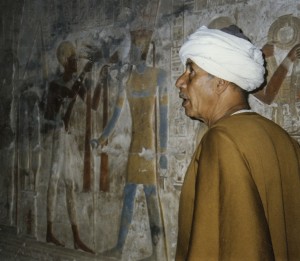
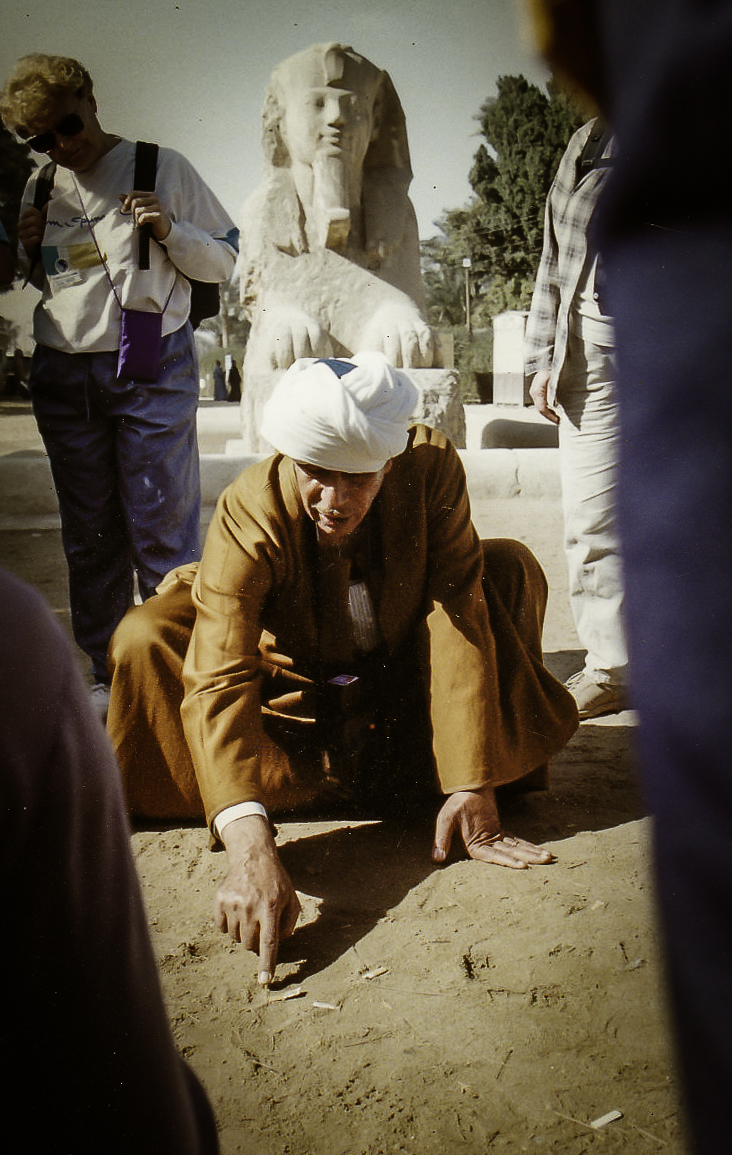
Combining his
education, field experience, and inner guidance, Hakim was able to reveal that
the ancient Egyptians, or Khemetians, as he called them, were far more technologically
and spiritually advanced than “his-tory” has given them credit for. As such, he
and his adopted son and longtime student, Stephen Mehler developed the field of
Khemitology. For years, people from all walks of life and fields of expertise,
came to Egypt to learn from, research and collaborate with Hakim, and he soon
became renowned worldwide.
Hakim started an information revolution that
continues today. His life’s work has been featured in Film Documentaries, such
as The Pyramid Code produced by Dr.
Carmen Boulter, and in many publications and books. He worked very closely with
Stephen Mehler in the writing of the popular books: The Land of Osiris and From
Light into Darkness.
Yousef, Moses, Raba, Miriam, Sadat, Yagoub and
Haroun Awyan consider themselves fortunate
to have been born into Hakim’s legacy
and are honored to continue their beloved father’s work.

5,000 year old Egyptian hieroglyphs found in New South Wales
by Paul White
There about 250 stone
carvings that have been part of the local folklore of the area for nearly a
century with reports of people who sighted them as far back as the early
1900's. The site was secretly visited by families "in the know" in
the 1950's and fell back into local mythology for a couple of decades until it
was accidentally rediscovered by a man looking for his lost dog.
The carvings are in a
rock cleft, a large block of split sandstone on a cliff-face that has created a
small chasm or "chamber" of two flat stone walls facing each other
that widens out from two to four metres and is covered in by a huge flat rock
as a "roof" at the narrow end. The cleft is most cave-like and only
accessible by a small rock chute from above or below, well disguised from the
average bush-walker.
When you first come up
the rock chute and climb into the stone hallway you are immediately confronted
by a number of worn carvings that are obviously ancient Egyptian symbols. These
are certainly not your average Aboriginal animal carvings, but something
clearly alien in the Australian bush setting. At the end of the chamber,
protected by the remaining section of stone roof, is a remarkable third-life
sized carving of the ancient Egyptian god Anubis, the Judge of the Dead.
Egyptologist Ray
Johnson, who had translated extremely ancient texts for the Museum of
Antiquities in Cairo eventually was successful in documenting and translating
the two facing walls of Egyptian characters - which stemmed from the Third
Dynasty. They allegedly chronicle a tragic saga of ancient explorers
shipwrecked in a strange and hostile land, and the untimely death of their
royal leader, "Lord Djes-eb".
A group of three
cartouches (framed clusters of glyphs) record the name of "RA-JEDEF"
as reigning King of the Upper and Lower Nile, and son of 'Khufu' who, in turn,
is son of the King 'Sneferu'. This dates the expedition just after the reign of
King Khufu (Cheops) alleged builder of the Great Pyramid. Lord Djes-eb may have
actually been one of the sons of the Pharaoh Ra Djedef, who reigned after
Khufu. Egyptian Dynasties
The hieroglyphic text
was apparently written under the instruction of a ship's captain or similar,
with the corner glyph on the wall displaying the title of a high official or
chief priest. The scribe is speaking for his Highness, the Prince, from this
wretched place where we were carried by ship. The expedition's leader, is
described in the inscriptions as the King's son, 'Lord Djes-eb', who came to
grief a long way from home. The hieroglyphics sketch his journey and his tragic
demise. Burial rituals, prayers and preparations are described.
For two seasons he made
my way westward, weary, but strong to the end.
Always praying, joyful,
and smiting insects.
He, the servant of God,
said God brought the insects.
Have gone around hills
and deserts, in wind and rain, with no lakes at hand.
He was killed while
carrying the Golden Falcon Standard up front in a foreign land, crossing
mountains, desert and water along the way.
He, who died before, is
here laid to rest.
May he have life
everlasting. He is never again to stand beside the waters of the Sacred Mer.
Mer meaning 'love'.
There was a moat around
the pyramid called the "waters of Mer".
The second facing wall,
which was much more seriously eroded, details the tragedy further.
This wall begins with
the badly eroded glyph of a snake (Heft), with a glyph of jaws (to bite) and
the symbol for 'twice'.
The snake bit twice.
Those followers of the
diving Lord 'Khufu', mighty one of Lower Egypt, Lord of the Two Adzes, not all
shall return.
We must go forward and
not look back.
All the creek and river
beds are dry. Our boat is damaged and tied up with rope.
Death was caused by
snake.
We gave egg-yolk from
the medicine-chest and prayed to Amen, the Hidden One, for he was struck twice.
We walled in the side
entrance to the chamber with stones from all around.
We aligned the chamber
with the Western Heavens.
The three doors of
eternity were connected to the rear end of the royal tomb and sealed in.
We placed beside it a
vessel, the holy offering, should he awaken from the tomb.
Separated from home is
the Royal body and all others.
Here is inscribed the
extraordinary story of the death and burial of 'Lord Djes-eb' one of the sons
of the Pharaoh Ra Djedef.
Search for Egypt's Nefertiti gains new momentum
LUXOR, Egypt (AP) — The
search for ancient Egypt's Queen Nefertiti in an alleged hidden chamber in King
Tut's tomb gained new momentum as Egypt's Antiquities Minister said Tuesday he
is now more convinced a queen's tomb may lay hidden behind King Tutankhamun's
final resting place.

While touring the
burial sites of Tutankhamun and other pharaohs in Luxor's famed Valley of the
Kings with British Egyptologist Nicholas Reeves, Minister Mamdouh el-Damaty
said he now thinks King Tut's 3,300 year-old pharaonic mausoleum probably
contains at least one hidden chamber.
Reeves theorized that
Tutankhamun, popularly known as King Tut, who died at the age of 19, may have
been rushed into an outer chamber of what was originally Nefertiti's tomb.
"I agree with him
that there's probably something behind the walls," el-Damaty said. But he
said if anyone is buried there it is likely Kia, believed by some Egyptologists
to be King Tut's mother.
High-resolution images
of King Tut's tomb "revealed several very interesting features which look
not at all natural, features like very, very straight lines which are 90
degrees to the ground, positioned so as to correspond with other features
within the tomb," Reeves said during the visit.
These features would
have been difficult to capture with the naked eye, he said.
View galleryThe tomb of
King Tut is displayed in a glass case at …
The tomb of King Tut is
displayed in a glass case at the Valley of the Kings in Luxor, Egypt, Tuesda …
Reeves said the walls
could conceal two unexplored doorways, one of which perhaps leads to
Nefertiti's tomb. He also argues that the design of the tomb suggests it was
built for a queen, rather than a king.
El-Damaty said he will
seek final approval for a radar inspection of the tomb.
Nefertiti, famed for
her beauty and who was the subject of a famous 3,300-year-old bust, was the
primary wife of the Pharaoh Akhenaten, who tried and failed to switch Egypt to
an early form of monotheism. Akhenaten was succeeded by a pharaoh referred to
as Smenkhare and then Tut, who is widely believed to have been Akhenaten's son.

Reeves believes that
Smenkhare is actually Nefertiti.
"Nefertiti
disappears ... according to the latest inscriptions just being found,"
said Reeves. "I think that Nefertiti didn't disappear, she simply changed
her name."
View galleryA policeman
takes a selfie at the Amenhotep II tomb …
A policeman takes a
selfie at the Amenhotep II tomb in the Valley of the Kings in Luxor, Egypt,
Tues …
After Nefertiti died,
Tut buried her, and then when he died someone decided to extend the tomb,
Reeves suggested. "Since Nefertiti had been buried a decade before, they
remembered that tomb was there and they thought, well, perhaps we can extend
it," he said.
The 1922 discovery of
Tutankhamun's tomb filled with artifacts, including the famed golden funeral
mask, made him known the world over, and boosted interest in that era, called
the Amarna period.
While inscriptions in
tombs provide some information, they are not always helpful in clarifying a
pharaoh's lineage.
"In the case of
royal tombs they're not dealing with mortal life. They're dealing with the
beyond," said Reeves, adding that writing things such as the family tree
"is just irrelevant."
Instead, these
inscriptions include things such as "spells to enable the deceased to
reach the lands of the gods," said Reeves. This means Egyptologists use a
number of factors to develop theories, leading to divisions among experts about
the period.
View
galleryEgypt's Antiquities Minister Mamdouh
el-Damaty, …
Egypt's Antiquities
Minister Mamdouh el-Damaty, left, and Nicholas Reeves, a British Egyptologis …
"Every
Egyptologist has got a different view on the Amarna period, because we have a
lot of evidence to discuss but not just quite enough to make a final decision,"
said Reeves.

"If we find
something extra, even one small new inscription would be a great bonus, it
could change everything," said Reeves.
Tut, Nefertiti, and
Akhenaten's family led Egypt during one of its most turbulent times that ended
with a military takeover by Egypt's top general at the time, Horemheb.

"Egypt basically
fell apart under Akhenaten and it was the military that pulled it all together
again," said Reeves, adding that Egyptians wiped out Tut's name from
official records of pharaohs.
Horemheb "made
laws to control the country and to fight against the corruption, against the
police who were corrupted, against the high officials," said Mohamed
Saleh, a former director of the Egyptian Museum who was also touring the site.
Tourism Minister Hesham
Zazou said he hopes the new discovery willrevive tourism in ancient Egyptian
sites. Tourism at Red Sea beach resorts is rebounding after years of turmoil
following the 2011 ouster of President Hosni Mubarak, said Zazou, but otherwise
"tourism is suffering tremendously."

Google Debuts New Chromecast TV Streaming Devices
When it comes to TV
streaming devices, Google’s Chromecast is easily one of the best values. It’s
$35; it lets you stream shows from your smartphone, laptop, or tablet to your
TV; and it’s so easy to use that your technology averse Uncle Joe could figure
it out. Just plug it into an HDMI slot in your HDTV and connect it to an app on
your device.

But at more than 2 years
old, the original Chromecast is now lagging behind Apple’s new Apple TV and
Amazon’s new Fire TV. That’s why Google is giving the Chromecast a much-needed
upgrade, which might just make this little streaming stick the best on the
market.
The new Chromecast gets
a new disc-shaped design that Google says helps the device’s three built-in
antennas capture the best available Wi-Fi signal in your home.
In fact, Google says
the new design and antenna configuration makes the new Chromecast better at
picking up weak Wi-Fi signals, which is great if you’re tired of seeing an
endless loading screen on Netflix.
The new Chromecast also
gets a built-in, flexible HDMI cable, rather than the separate clunky cable
that came with the first Chromecast.
A smarter app
Chromecast uses your
phone to let you find videos to watch and then stream them to your TV. But the
original app left much to be desired.
To that end, Google has
also updated the Chromecast’s app. The new What’s On feature tells you, well,
what’s on at the moment. So now, rather than trying to hunt through each of
your apps to find something to watch, Chromecast will let you know by
displaying a list of shows from all of your compatible Chromecast apps.
There’s also a new
Search feature that lets you look for shows, movies, or actors, and then
displays your viewing options, so you can pick the one that’s cheapest.
The updated Chromecast
also gets a new Fast Play feature that can see what video app you’re looking at
on your phone, and automatically begin launching Chromecast, so you no longer
have to wait as long for your videos to play.
For instance, if you’re
looking at Netflix on your phone, Fast Play will recognize that you’ve recently
watched an episode of “Narcos” and begin downloading the next one, so you can
begin watching it instantly.
In addition to the new
video-oriented Chromecast, Google has also unveiled its new Chromecast Audio —
an odd hockey-puck-shaped device that lets you stream audio across multiple
audio devices over Wi-Fi.

By Daniel Howley
Subscribe to:
Posts (Atom)


